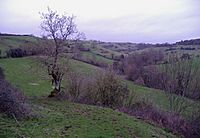St. Catherine's Valley facts for kids
| Site of Special Scientific Interest | |
 |
|
| Area of Search | Avon |
|---|---|
| Grid reference | ST760725 |
| Interest | Biological |
| Area | 156.1 hectare |
| Notification | 1997 |
| Location map | English Nature |
St. Catherine's Valley is a really special place for nature. It's located southwest of a village called Marshfield in South Gloucestershire. This area is known as a Site of Special Scientific Interest, or SSSI for short. It was officially recognized as an SSSI in 1997.
At one end of the valley, near Marshfield, you can find a lot of a plant called Dragon's Teeth. Its scientific name is Tetragonolobus maritimus. This plant isn't originally from Britain, but it has grown very well here. A person named Rev. E. Ellman first discovered it in the valley way back in 1927.
What Makes St. Catherine's Valley Special?
St. Catherine's Valley is a large area, about 156.1 hectares. That's like 385 football fields! It's protected because it's a "biological" SSSI. This means it's important for its plants, animals, or the types of habitats it has.
Why Are SSSIs Important?
A Site of Special Scientific Interest (SSSI) is a protected area in the United Kingdom. These places are chosen because they have rare wildlife, plants, or special geological features. Protecting them helps make sure these important natural spots stay healthy for the future.
The Mystery of Dragon's Teeth
The Dragon's Teeth plant found here is quite interesting. It's considered a "naturalised population." This means it wasn't originally from Britain, but it has been growing here for a long time. It now grows and spreads on its own, just like native plants. Finding such a large group of this non-native plant makes St. Catherine's Valley even more unique.
 | Stephanie Wilson |
 | Charles Bolden |
 | Ronald McNair |
 | Frederick D. Gregory |

